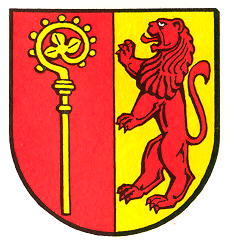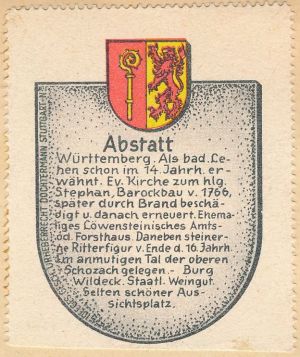Abstatt: Difference between revisions
Knorrepoes (talk | contribs) m (Text replacement - ".jpg|center]] ====Official blazon====" to ".jpg|center|Wappen von {{PAGENAME}}]] ====Official blazon====") |
Knorrepoes (talk | contribs) m (Text replacement - ": " to ":") Tags: Mobile edit Mobile web edit |
||
| (31 intermediate revisions by the same user not shown) | |||
| Line 1: | Line 1: | ||
'''ABSTATT''' | '''ABSTATT''' | ||
State : [[Baden-Württemberg]]<br/> | State:[[Baden-Württemberg]]<br/> | ||
District (Kreis) : [[Heilbronn (kreis)|Heilbronn]] | District (Kreis):[[Heilbronn (kreis)|Heilbronn]] | ||
[[File:abstatt.jpg|center|Wappen von {{PAGENAME}}]] | [[File:abstatt.jpg|center|alt=Wappen von {{PAGENAME}}/Arms (crest) of {{PAGENAME}}]] | ||
= | {| class="wikitable" | ||
|+Official blazon | |||
|- | |||
|'''German''' | |||
| In gespaltenem Schild vorne in Rot ein linksgewendeter goldener Abtsstab, hinten in Gold ein roter Löwe. | |||
|- | |||
|'''English''' | |||
| blazon wanted | |||
|} | |||
===Origin/meaning=== | |||
The oldest known seal of Abstatt dates from 1628 and shows a lion on a hill. The lion is the lion of the family and Estate Löwenstein, as Abstatt was bought by Löwenstein in 1490. Several other seals until the early 20<sup>th</sup> century all show the lion. | The oldest known seal of Abstatt dates from 1628 and shows a lion on a hill. The lion is the lion of the family and Estate Löwenstein, as Abstatt was bought by Löwenstein in 1490. Several other seals until the early 20<sup>th</sup> century all show the lion. | ||
The present arms were designed in 1907 by the State Archives, who added a canting crosier (Abt= | The present arms were designed in 1907 by the State Archives, who added a canting crosier (Abt=Abbot). These arms were adopted by the municipality on November 21, 1907. | ||
As the crosier was a religious symbol, the State Archives also proposed a second design, showing the lion under a chief with the deer antler of Wüttemberg. The council, however, did not object to the first design. | As the crosier was a religious symbol, the State Archives also proposed a second design, showing the lion under a chief with the deer antler of Wüttemberg. The council, however, did not object to the first design. | ||
{|align="center" | |||
|align="center"|[[File:{{PAGENAME}}.uhd.jpg|center|300 px|Wappen von {{PAGENAME}}/Coat of arms (crest) of {{PAGENAME}}]] <br/>The arms shown in an [[Unsere deutsche Heimat|album]] from 1952 | |||
|} | |||
{{de}} | |||
{{media}} | {{media}} | ||
[[Literature]] : Gönner, 1965; Bardua, 1987 | [[Civic Heraldry Literature - Germany|'''Literature''']]:Gönner, 1965; Bardua, 1987 | ||
[[Category:German Municipalities A]] | [[Category:German Municipalities A]] | ||
Latest revision as of 11:30, 10 August 2024
ABSTATT
State:Baden-Württemberg
District (Kreis):Heilbronn
| German | In gespaltenem Schild vorne in Rot ein linksgewendeter goldener Abtsstab, hinten in Gold ein roter Löwe. |
| English | blazon wanted |
Origin/meaning
The oldest known seal of Abstatt dates from 1628 and shows a lion on a hill. The lion is the lion of the family and Estate Löwenstein, as Abstatt was bought by Löwenstein in 1490. Several other seals until the early 20th century all show the lion.
The present arms were designed in 1907 by the State Archives, who added a canting crosier (Abt=Abbot). These arms were adopted by the municipality on November 21, 1907.
As the crosier was a religious symbol, the State Archives also proposed a second design, showing the lion under a chief with the deer antler of Wüttemberg. The council, however, did not object to the first design.
| The arms shown in an album from 1952 |
This page is part of the German heraldry portal Deutsche Wappensammlung |
Heraldry of the World |
|
German heraldry:
|
Selected collector's items from Germany:
|
Contact and Support
Partners:
Your logo here ?
Contact us
© since 1995, Heraldry of the World, Ralf Hartemink 
Index of the site
Literature:Gönner, 1965; Bardua, 1987













